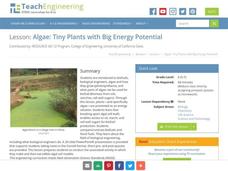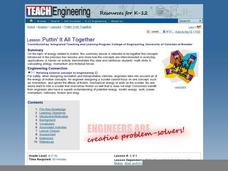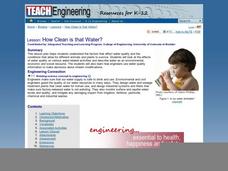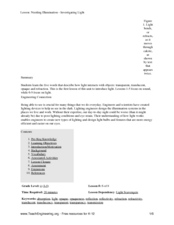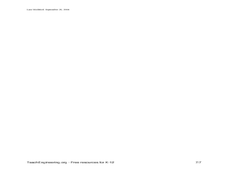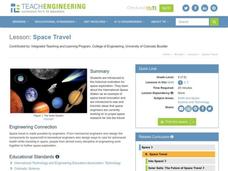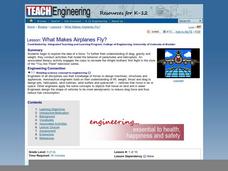Teach Engineering
Maximum Mentos Fountain
A messy fountain is potentially an energy experiment in disguise. Groups investigate the variables in creating a fountain from soda and Mentos. The last activity in a six-part series on energy has the class observe the fountain in terms...
Teach Engineering
Algae: Tiny Plants with Big Energy Potential
My, what big energy potential you have! Scholars learn about the energy potential of using algae as a biofuel. A PowerPoint presentation first describes the structure of algae and then how researchers use algae as biofuel to produce energy.
Curated OER
Puttin' It All Together
Students explain the concepts of kinetic and potential energy and how it can change forms. In this energy, motion, and frictional forces instructional activity students participate in a hands on activity that includes calculating...
Teach Engineering
Win that Bid! Selling Your Power Solution
Power up! Class members research a type of power production using a great resource featuring a real-world problem. Groups select a type of power generation and pretend that they represent an engineering firm for their chosen power type....
Teach Engineering
Wimpy Radar Antenna
The Diary of a Wimpy Antenna? In the last installment of a six-part series, your class constructs a model of a radio antenna and tests its torque. Pupils use the results to design a better model that resists bending and twisting forces.
Teach Engineering
Exploring the Forces of Tension
Let the resource stretch the minds of your young scientists with a lesson plan about tensile strength and stiffness of materials. Groups consider how easily materials stretch and relate this property to engineering design.
Teach Engineering
Fairly Fundamental Facts About Forces and Structures
Don't twist and turn looking for a resource. The first installment of a six-part series teaches young engineers about the five fundamental forces of compression, tension, shear, bending, and torsion. These forces help explain different...
Teach Engineering
Investigating Torque
Torque--a teachable moment? Here's a lesson on torque (or moment) and variables that include size, reinforcement, structural bracing, and material that affect torque.
Curated OER
How Clean is the Water?
Students read about and discuss water and how it is used as a resource and how engineers use technology to preserve it. In this water lesson plan, students look at a picture of water treatment and tell what is wrong with the picture.
Teach Engineering
Levers that Lift
Introduce your class to to the remaining three simple machines-- the lever, pulley, and the wheel-and-axle with a plan that includes the three different types of levers in the discussion of levers. The lesson continues with the...
Teach Engineering
Magnetic Fields Matter
Help your young scientists learn which materials are affected by magnetic fields with an activity that presents the information about different types of materials — diamagnetic, paramagnetic, and ferromagnetic — and their interaction...
Curated OER
Making & Breaking : The Rock Cycle
Students examine the rock cycle and how rocks can change over time. In this geotechnical engineering instructional activity students draw a diagram of the rock cycle.
Curated OER
Mice Rule!
Learners explain what biodiversity is and how adaptive features are maintained in a population. For this biodiversity lesson students complete a simple activity involving mouse populations.
Curated OER
Investigating Light
Learners study concepts associated with light. In this light lesson, students observe an demonstration by the teacher. They examine reflection and refraction of light and name things that reflect light and those that refract it. They...
Teach Engineering
Not So Simple
Compound machines, nothing more than a combination of simple machines working together, are the focus of an activity that asks class members to use the provided information to take a look at the way innovators combine simple machines to...
Curated OER
Off the Grid
Students examine the advantages and disadvantages of renewable and non renewable energy sources. In this engineering instructional activity students explain what it means for a house to be "off the grid".
Curated OER
Our Amazing, Powerful Sun
Learners examine where energy comes from and how it can be used. In this solar energy lesson students explore different aspects of the sun.
Curated OER
Passive Solar Design
Students study what passive solar design is for buildings and structures. In this solar design lesson plan students identify passive solar design techniques.
Curated OER
Plumbing the Deep-Using Sound Waves to See
Young scholars explore and learn about the concept of echolocation. In this echolocation instructional activity, students explore how animals and engineers use echolocation (seeing under water) and sound waves to look and hear things...
Teach Engineering
Solenoids
Metal slinkies, coils of wire, magnetic fields, and MRIs. To determine the safety hazards of MRI machines, class members use the provided formula to calculate the magnetic field along the axis of the solenoid.
Curated OER
Space Travel
Young scholars study the International Space Station and space exploration. In this space travel lesson plan students describe the different types of engineers that contribute to space travel.
Curated OER
We've Come a Long Way, Baby!
Students study technology and the different reproductive technologies available today. In this human reproductive technology lesson students describe how engineers create technologies to improve the health of mothers and babies.
Teach Engineering
Weather Basics
Weather — there's more to it than meets the eye of the storm. With this resource young meteorologists learn about the basics of weather, including information about the factors that influence the weather, common weather vocabulary,...
Curated OER
What Makes Airplanes Fly?
Students examine force and conduct activities that model parachutes and helicopters. In this airplanes lesson students identify the forces that make airplanes fly higher and land.



